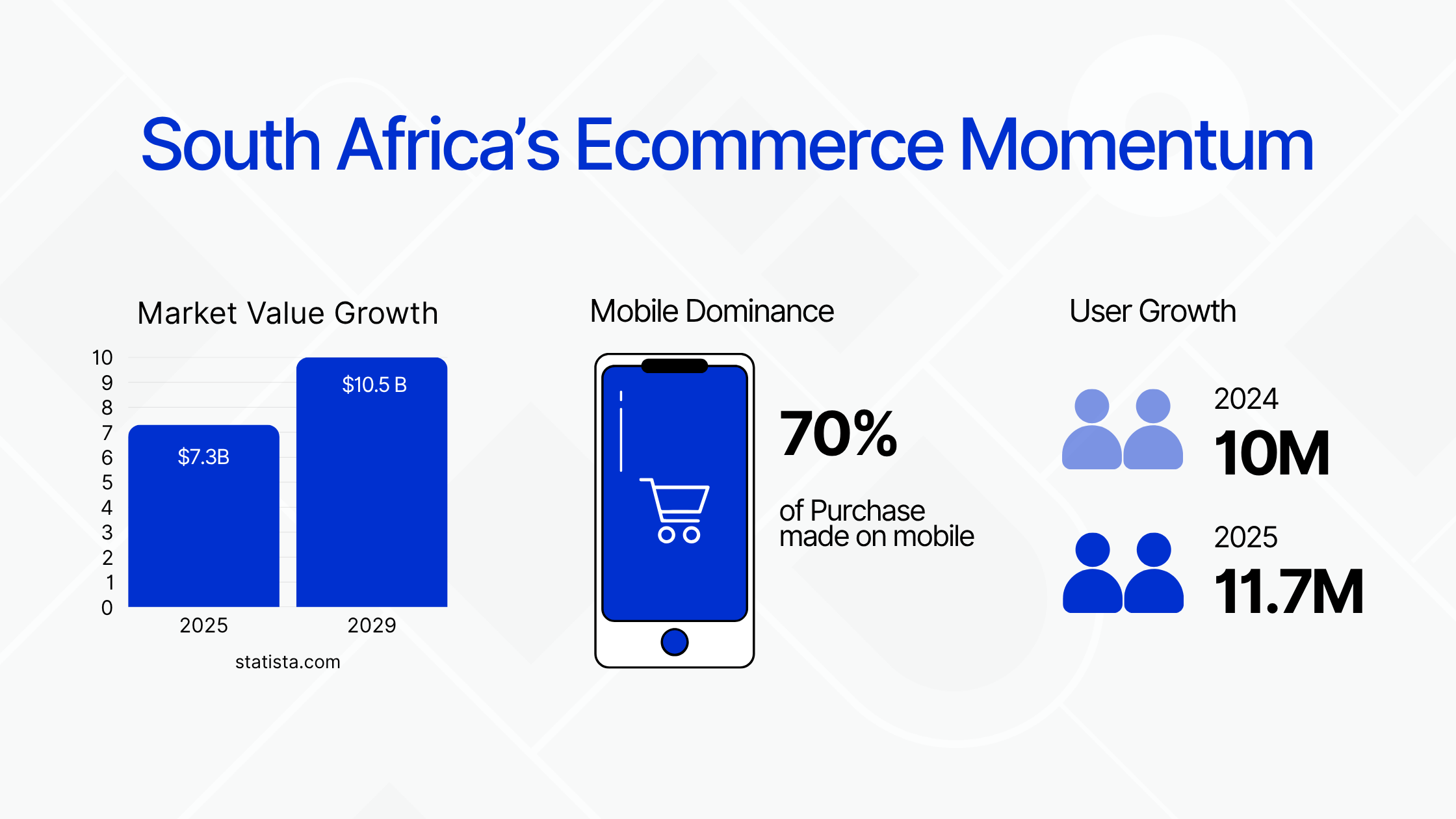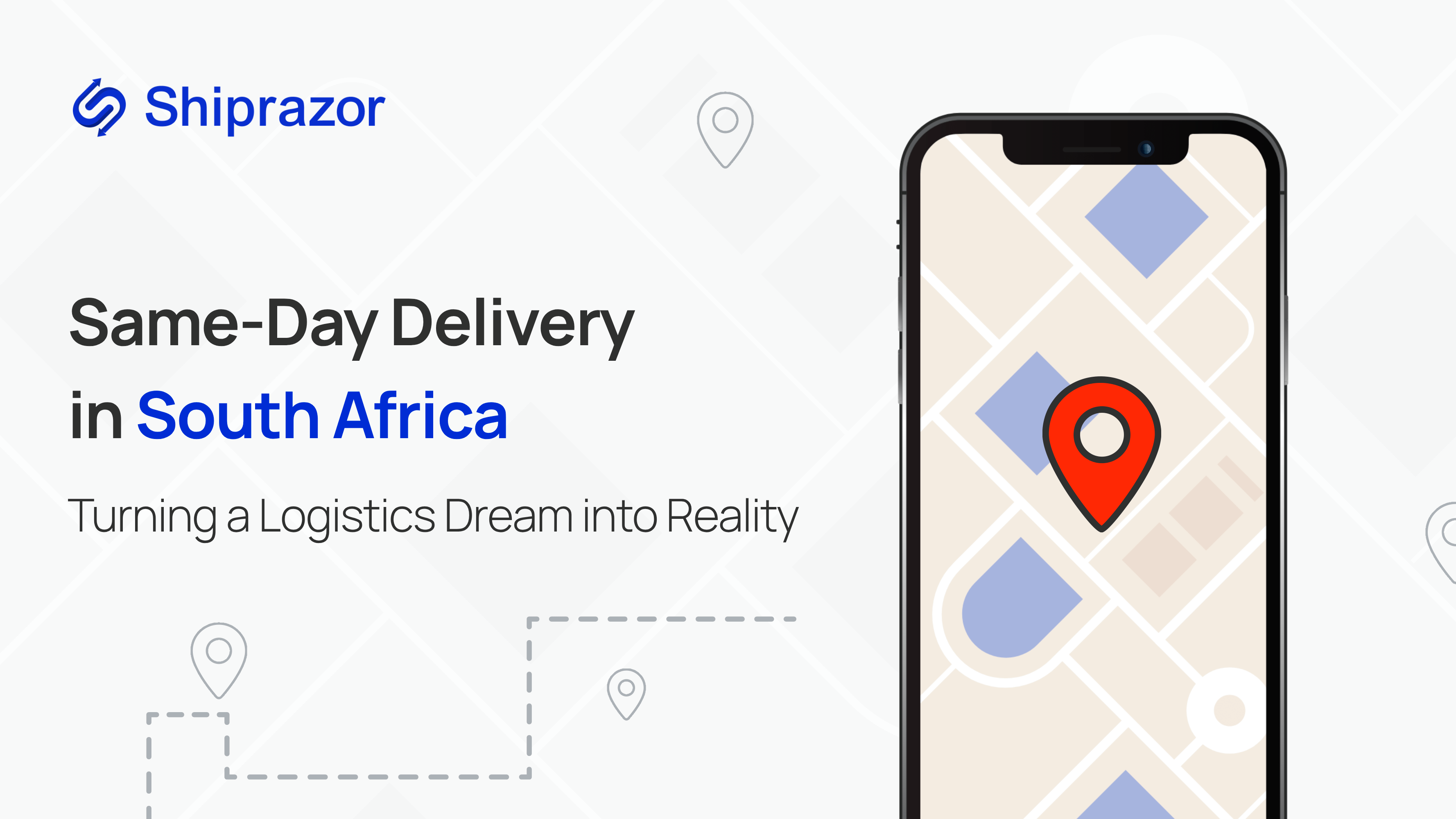While same-day delivery has become scalable in most parts of the world, for some countries it still remains a distant dream. With a dire need for instant gratification, everyone likes instant delivery of their daily essentials. This has led to increasing competition in the market and a rise of companies which are moving towards scalable ecommerce. However, the same cannot be said about ecommerce practices in South Africa.
In order to come at par with the global companies, there needs to be a rapid shift in the delivery processes in South Africa. With the introduction of reliable and secure ways to provide same-day delivery, it is possible to take the ecommerce in underdeveloped countries to unimaginable heights.
The eCommerce Scenario in South Africa
The market in South Africa has seen remarkable growth when it comes to e-commerce. People are now opting for online shopping when it comes to even the most basic of their necessities such as groceries. One of the most important growth enablers being the logistics, it has seen a shift like never before.
According to Times Live, over 50% of internet users in South Africa shop online. 56% of these users are above the age of 16.
There has been a significant increase in the number of people demanding rapid delivery, especially in more developed cities like Johannesburg, Durban, Cape Town, etc. This has led to an ever-increasing demand for the acceleration of the same-day delivery process. The same-day delivery has also led to an instant gratification of the user’s needs, thereby contributing to its ever-increasing popularity.
Possible Challenges in The Implementation of Same-day Delivery in South Africa
Higher Delivery Cost – Same day delivery would incur a lot of additional costs such as higher labour input, better speed, more trips, etc. All these factors would lead to either more cost for the customers or a lesser profit margin, both would be unfavourable to the economy of South Africa.
As per Dynamic Yield, 55% of online shoppers abandon their cart due to high delivery fees.
Consumer Behavior – The behavior of the consumers can be quite unpredictable. They might expect communication through App notifications or WhatsApp instead of an email. This might lead to missed deliveries, increased expenditure and delays in the delivery timelines.
Traffic – During the peak hours, major cities like Cape Town and Johannesburg experience major congestion and traffic jams. Even when a single order gets delayed, it creates a rupture in the entire pipeline of orders for the same delivery executive. There is a need to make proactive use of AI to map out cities and with the right GPS tracking, it would be possible to deliver the parcel with the shortest delivery time.
Infrastructure – As opposed to developed countries which run on a very efficient GPS mapping and strong roadways, a country like South Africa lacks these facilities. For a service like same-day delivery, there is a need to have reliable connectivity, paved roads and proper addresses in place. With these minor facilities in place, it will be easier to have a proper delivery tracking and route mapping in place.
Risk of Theft – There are certain high crime areas in South Africa. These areas are more prone to hijacking of orders and thefts. The delivery personnel may suffer physical harm in the process and it can also hamper the scheduled deliveries for a particular day. One of the ways in which this challenge can be avoided is by sending the orders in security boxes which can only be opened when a customer gives the OTP.
Limited Delivery Window – The same-day delivery process requires a very efficient team to pick, pack and deliver orders within hours of them being placed. If there is a dely at any stage, it will lead to a shift in the entire delivery process. There is a need to create more real-time order management systems that would easily dissolve cancellation and substitution issues.
How To Make Same-Day Delivery Possible In South Africa?
Technology alone won’t be able to make same-day delivery in South Africa a reality. It is equally important to make use of human intelligence. There is a need to study the terrains, geography and psychology of the people residing in the country. There is a need to provide contextual training to the team members in order to facilitate a seamless delivery. It can be made possible with the implementation of the following three principles:
Humanization: A process should be in place to understand the communities of the country which will enable the team to focus on the ground reality.
Digitization: By making use of digital tools such as artificial intelligence, there would be a lesser scope for human error and a possibility for increased speed.
Decentralization: In order to enable a faster response, there is a need to include smaller and regional fulfillment centers. They will ensure a more seamless process for same-day deliveries.
What Does The Future Hold?
With the ever-evolving logistics in South Africa, same-day delivery will no longer be limited to only groceries and clothing. There has been an increase in the number of online pharmacies and fast fulfillment centers which has been a key brand differentiator. The next step in the process could potentially involve the following measures- sustainability driven deliveries, a good supply of delivery vehicles, dynamic pricing models and crowdsourcing of last-minute delivery models.
By bringing these practices into action, we will be able to build a stronger network for same-day delivery in South Africa. Regardless of their location, every customer would be able to get access to reliable, same-day and secure delivery of their essentials.
It is true that the implementation of same-day delivery in South Africa would come with its potential set of challenges. With a combination of latest technology with local insights, same-day delivery would become a reality in every city. While it is not wholly possible to replicate global models, it is possible to fit in the ground reality with a renewed set of expectations. The future of same-day delivery should be created, one package at a time!
Stats

1) In 2025, the online shopping market in South Africa is worth about US $7.32 billion, and it is expected to reach US $10.5 billion by 2029.
Souce – https://www.statista.com/outlook/emo/ecommerce/south-africa
2) In South Africa, almost 70% of online shopping happens on mobile devices.
Source – https://mycodelesswebsite.com/mobile-ecommerce-statistics/
3) In 2024, over 10 million South Africans bought something online. This figure is set to grow to 11.7 million by 2025.
Source – Times Live
4) In 2025, South Africa’s e-commerce market is worth about US $7.3 billion and is expected to grow at nearly 9–10% per year, reaching over US $10 billion by 2029.
Source – https://www.statista.com/outlook/emo/ecommerce/south-africa

